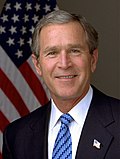History of the policy
Named for Mexico City, the venue of the United Nations International Conference on Population and Development where it was announced, the policy was instituted by U.S. President Ronald Reagan in 1984. [21] [22] [23] The final language of the 1984 policy was negotiated by the deputy chairman of the U.S. delegation, Alan Keyes, then an Assistant Secretary of State. [24]
After the establishment of the Mexico City policy, organizations were required to meet its specified conditions in order to be eligible for federal funding from the United States, and as a result, several international abortion agencies no longer received a portion of their funds from this source. The International Planned Parenthood Federation (IPPF) did not alter its operation and lost more than 20% of its total funding. Other family planning organizations, such as the Family Guidance Association of Ethiopia and the Planned Parenthood Association of Zambia, likewise did not make the changes required by the Mexico City policy and had their funding cut. NGOs in Romania and Colombia adapted to the new U.S. guidelines and continued to qualify for federal funding. [25]
In 1987 and 1988, the policy was challenged by two U.S. Appeals court rulings in DKT Memorial Fund Ltd. vs. USAID, involving Phil Harvey and two foreign NGOs, [26] and Planned Parenthood Federation of America, Inc. v. USAID . [27] Ultimately, the two court rulings contributed to the policy being used only against foreign NGOs, while not invoked against U.S. NGOs.

President Bill Clinton rescinded the Mexico City policy on January 22, 1993. He referred to the policy as being "excessively broad" and stated that it had "undermined efforts to promote safe and efficacious family planning programs in foreign nations". [4] On January 22, 2001, President George W. Bush reinstated the policy, stating, "It is my conviction that taxpayer funds should not be used to pay for abortions or advocate or actively promote abortion, either here or abroad. It is therefore my belief that the Mexico City Policy should be restored". [28] In September 2007, Barbara Boxer, a Senator from California, created an amendment designed to lift the funding conditions put in place by the Mexico City policy. It passed by a vote of 53–41. President Bush promised to veto any legislation which would eliminate the Mexico City policy. [29] The policy was rescinded again by President Barack Obama on January 23, 2009, [7] and further reinstated on January 23, 2017 by President Donald Trump. [10] Trump not only reinstated the policy but expanded it, making it cover all global health organizations that receive U.S. government funding, rather than only family planning organizations that do, as was previously the case. This includes offices such as USAID, the Department of State, Global Aids Coordinator, Center of Disease Control and Prevention, National Institute of Health, and Department of Defense. [30]
The nature of the policy has implications for organizations in certain countries such as South Africa. Even if these organizations support the policy itself, it is illegal for them not to inform a woman seeking an abortion of her rights, and/or refer her to a facility where she may have an abortion. The President's Emergency Plan for AIDS Relief (PEPFAR) was excluded from the Mexico City policy under the George W. Bush administration, but was not excluded after the Mexico City policy was reinstated on January 23, 2017. [31]
In May 2017, Rex Tillerson announced an expansion of the policy; originally a ban covering roughly $600 million in family planning money, the Trump policy since then applied to all international health care aid doled out by the U.S. government — nearly $9 billion. [32]
The Mexico City policy was rescinded again by President Joe Biden on January 28, 2021. [33] On January 24, 2025, President Donald Trump reinstated the Mexico City Policy. [34]
Impact
A 2011 study that examined Sub-Saharan Africa found that the Mexico City policy had the unintended consequence of increasing the number of abortions, with the authors suggesting that the reduction in financial support for family planning organizations led to a greater number of accidental pregnancies. [15] A 2015 study of Ghana found that the policy increased unintended pregnancies and abortions. [16] In a 2017 editorial for The New England Journal of Medicine , Stanford University health experts Nathan Lo and Michele Barry said that research showed the policy increases unintended pregnancies and abortions. They wrote that "the reinstatement of the Mexico City Policy is a stark example of 'evidence-free' policymaking that ignores the best scientific data, resulting in a policy that harms global health and, ultimately, the American people." [35] 2017 editorials in The BMJ by University of Michigan Medical School health experts and The Lancet by University of Toronto, Columbia University, and Guttmacher Institute health experts concluded the same. [36] [37] [38]
According to a 2019 study in The Lancet, the implementation of the Mexico City policy during the George W. Bush administration (2001–2009) unintentionally led to more abortions. By limiting funding for family planning organizations, which use abortion as one of many methods of family planning, use of contraceptives reduced and pregnancies increased. When the Mexico City policy was in effect under the Bush administration, the abortion rate was 64% higher in thirteen countries highly affected by the policy than in other comparable countries. Under the immediately preceding Bill Clinton administration when the policy was not in effect, the abortion rate in the thirteen countries was 8% lower than in the other comparable countries. The authors of the study estimate that Bush's imposition of the Mexico City policy increased the abortion rate in the thirteen countries by 40%, and the rest of the increase had other causes. [14] In her 2019 book The Global Gag Rule and Women's Reproductive Health, Rutgers University economist Yana van der Meulen Rodgers commented that Mexico City policy had not reduced abortions, likely increased unsafe abortions, and adversely affected health outcomes for men, women, and children. [1]

